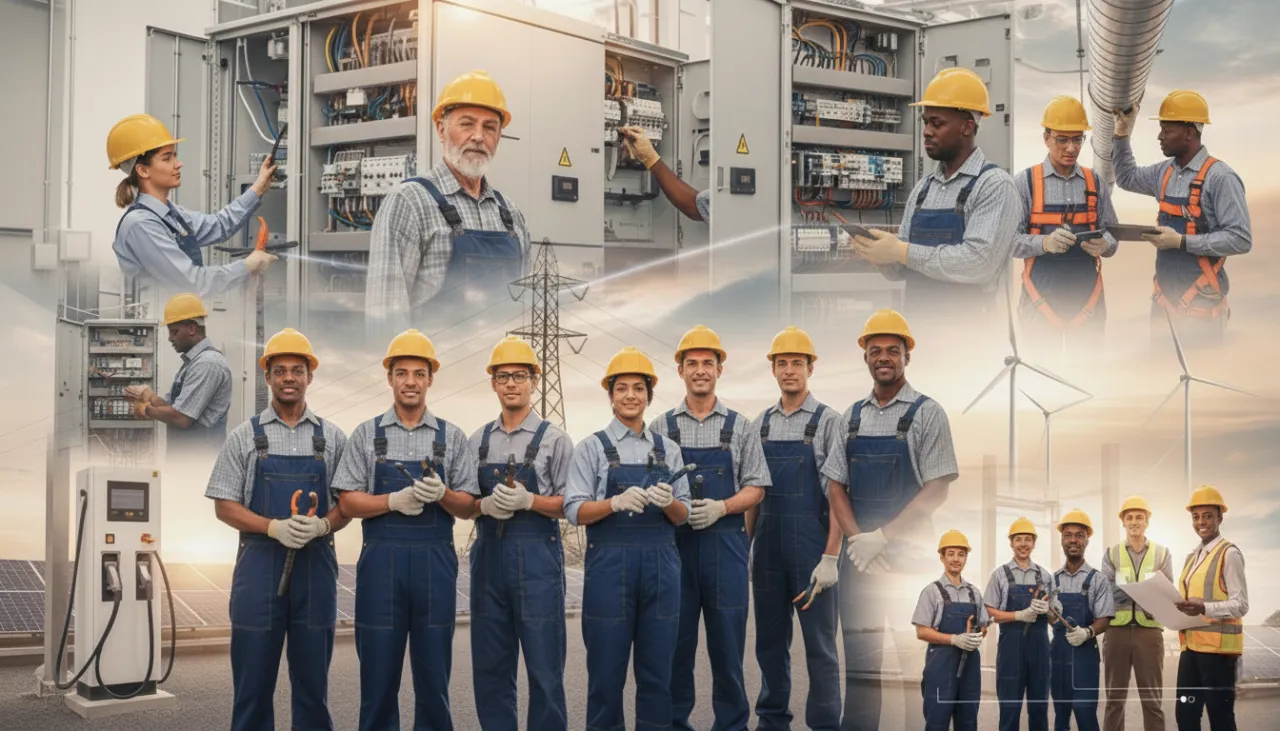Why Becoming an Electrician Is the Smartest Career Move Right Now
In a world obsessed with technology, remote work, and digital transformation, the most powerful careers aren’t always behind a computer screen. Across America, electricians — the skilled professionals who literally keep the lights on — are experiencing a surge in demand, pay, and prestige.
From smart homes to EV charging stations, electricians are at the heart of the country’s clean-energy revolution. And as automation takes over other jobs, this trade stands strong as one of the few AI-proof careers left.

The Unseen Force Behind Modern Life
Every home, office, hospital, and factory runs on electrical systems. Yet few people realize that behind every switch, server, or solar panel stands a licensed electrician — ensuring everything works safely and efficiently. Electricians don’t just wire buildings anymore. Today, they design and maintain smart energy systems, integrate solar power, and support the massive expansion of electric vehicle infrastructure across the nation. As the U.S. pushes toward renewable energy independence, the electrician’s role has evolved from a blue-collar job to a high-tech career that blends hands-on skill with cutting-edge technology.
High Demand, Real Security
Across industries, layoffs and AI-driven cutbacks are making headlines. But in the trades, especially electrical work, it’s the opposite.
Companies can’t find enough qualified electricians — from construction firms and manufacturing plants to tech companies building data centers.
Electricians are now among the most in-demand professionals in the country, with tens of thousands of job openings nationwide.
- Residential demand is booming thanks to smart home upgrades.
- Commercial construction projects need certified electricians for compliance.
- Renewable energy expansion is creating new, specialized roles in solar and battery systems.
Job security in this trade is unmatched — because no matter how advanced AI becomes, someone still has to install, repair, and maintain the real-world systems that power it.
A Career That Pays — Literally
Electricians aren’t just in demand — they’re getting paid accordingly. The average U.S. electrician earns $60,000–$75,000 per year, with experienced specialists easily crossing six figures. Apprentices often start earning while they train, avoiding student debt while gaining real-world experience.
Union electricians, especially those working in cities or on large-scale energy projects, enjoy premium wages, overtime pay, and strong retirement benefits.
And unlike many office jobs, the income grows directly with experience — not just tenure. Master electricians or independent contractors can earn more than many engineers or IT managers.
No Degree, No Problem — Just Skill
One of the biggest appeals of the electrician career is accessibility. You don’t need a four-year degree or thousands in student loans. What you need is focus, training, and certification — usually through a trade school or apprenticeship program. Most programs combine classroom instruction with paid, supervised fieldwork. In 3–5 years, an apprentice can become fully licensed and start earning top rates in a field where skills matter more than diplomas.
This “earn while you learn” model is drawing thousands of career changers — from ex-office workers to tech professionals — who want more stability, freedom, and tangible results from their work.
The Green Energy Revolution Needs Electricians
The future of clean energy depends on electricians. Every solar panel installed, every EV charger connected, and every modern building retrofit requires licensed professionals to bring it all together. As the U.S. shifts toward sustainable energy and smarter infrastructure, electricians are becoming the backbone of the nation’s green transformation. Solar technicians, smart grid electricians, and energy efficiency specialists are emerging as high-growth roles — blending traditional trade skills with renewable technology. That means today’s electricians are tomorrow’s clean-energy engineers.
AI Can’t Replace Human Hands
In an age where artificial intelligence is rewriting job descriptions, skilled trades like electrical work remain deeply human. While AI can design circuits or predict energy use, it can’t crawl through ceilings, run conduits, or troubleshoot live systems in real-world conditions. That’s what makes this career “future-proof.” Electricians rely on judgment, dexterity, and adaptability — qualities no algorithm can replicate.
And as smart systems get smarter, demand for human technicians who can interpret, repair, and optimize them continues to climb.
Opportunities Coast to Coast
Electrician demand stretches across every U.S. region:
- California leads with renewable energy and EV projects.
- Texas drives large-scale construction and industrial growth.
- Florida and Georgia face housing booms requiring residential electricians.
- New York and Illinois invest in smart grids and retrofitting older buildings.
No matter the state, opportunities are abundant — with both local companies and national contractors actively hiring and offering relocation bonuses for certified professionals.
Work That Builds More Than a Paycheck
Beyond the money and job security, what draws people to this trade is the satisfaction. Electricians build things that last. They see their work come alive — from lighting a family’s first home to wiring an entire stadium or hospital wing. Many electricians describe their work as “real impact you can touch” — a refreshing contrast to abstract office roles.
This sense of accomplishment, combined with steady pay and independence, makes it one of the most rewarding professions available today.
The Bottom Line: The Power Is in Your Hands
If you’re searching for a career that combines technology, stability, and purpose, the electrician path might be your best move yet. It’s a career where skill beats automation, where experience translates directly into value, and where the demand isn’t going away anytime soon.
As America continues to electrify everything from vehicles to cities, electricians are becoming the heroes behind the switch — quietly powering the next century.











